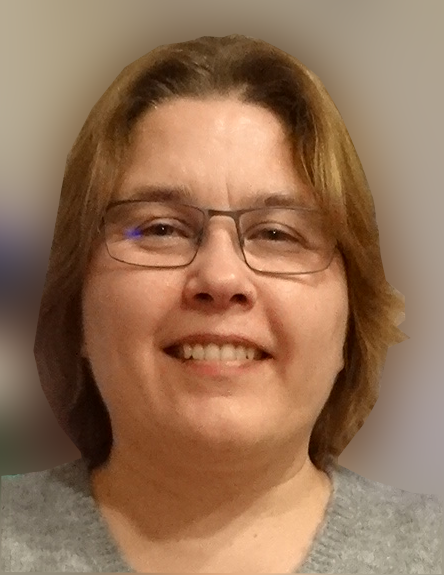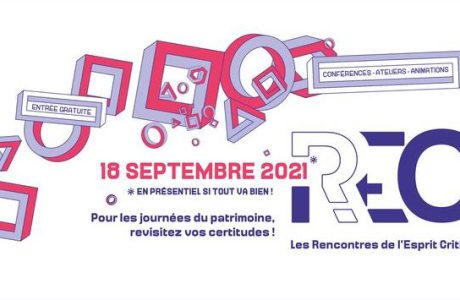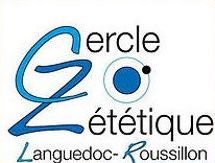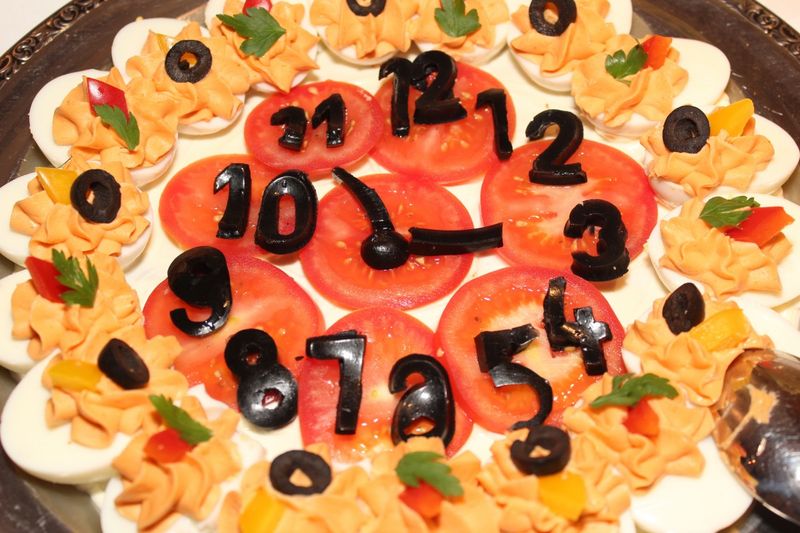This post develops my thoughts and feelings about REC 2021. REC for Rencontres de l’Esprit Critique in French. This event constitutes an educational festival for everybody dedicated to critical thinking and skepticism in several fields of the daily life.
To begin, I highlight the event with its poster and some pieces of information about it. Then, I present the summary of this post.
| EVENT | |
|---|---|
| Banner source: 🔗 https://www.piqsels.com/fr/public-domain-photo-irupj | |
 | |
| Poster source: 🔗 https://www.facebook.com/REC2021TLSE/ | |
| Title | REC 2021 (Les Rencontres de l’Esprit Critique 2021 in French) A possible translation: Meetings of the Critical Mind. |
| Date | Saturday, September 18, 2021 |
| Place | Diagora Center in Toulouse-Labège |
| Manifesto | https://www.rec2021.com/wp-content/uploads/2021/09/Manifeste.pdf |
| Schedule | https://www.rec2021.com/wp-content/uploads/2021/08/2021-08-30-programme-rec-version-print2.pdf |
| Keywords | critical mind, zetetique, skepticism, science, knowledge, scientific approach, veracity, belief, empathy, doubt, awareness |
1. My personal interest▲
As a member for several years of the ALDERAN association and assist in some events of the Cercle Zététique du Languedoc-Roussillon (CZLR), I am sensitive to societal issues relating to critical mind and I am attentive to any event or gathering that allows sharing testimonials on the subject. At the end of August, I heard about these meetings called REC via Facebook and naturally decided to participate, especially since its program is attractive 🙂
To find out more about these associations :
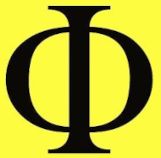
|
| ALDERAN association Toulouse |
During the day, I could meet the president of the Cercle Zététique Languedoc-Roussillon association, Dominique Bouette, who had come from Montpellier to attend this first for the REC event. Greetings to all members of zetetic and skeptical associations!
2. The REC 2021 program▲
2.1. The schedule of the activities▲
The program in the hemicycle is intended for a family audience:
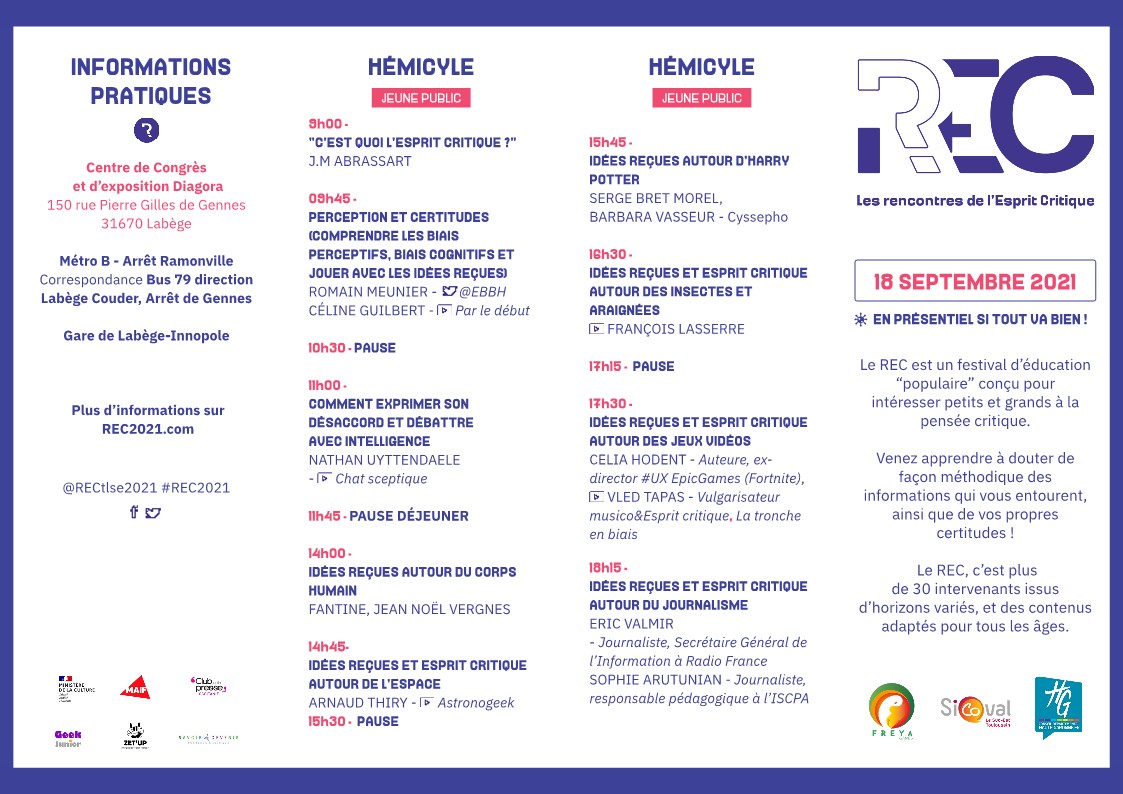
The program in the amphitheater is intended for a more informed audience:
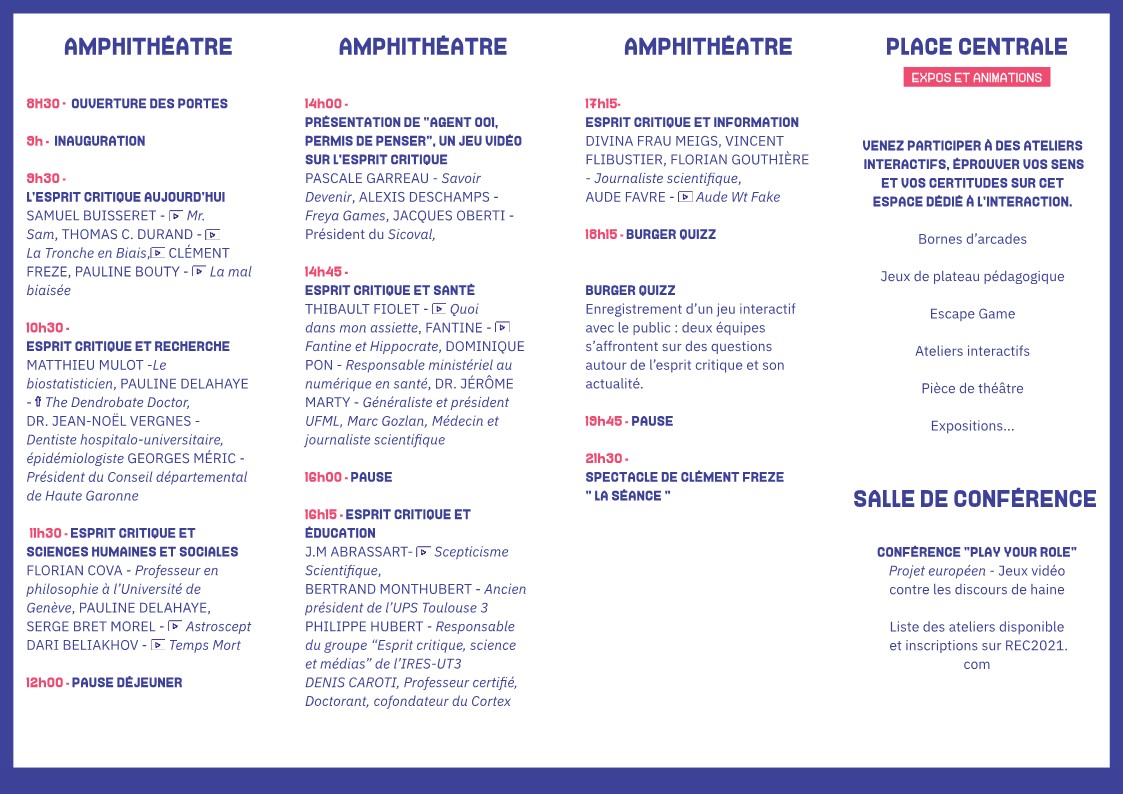
The schedule of the activities for this festival can be found in this document in PDF format in French: REC2021_Programme_activites.pdf
2.2. The manifesto▲

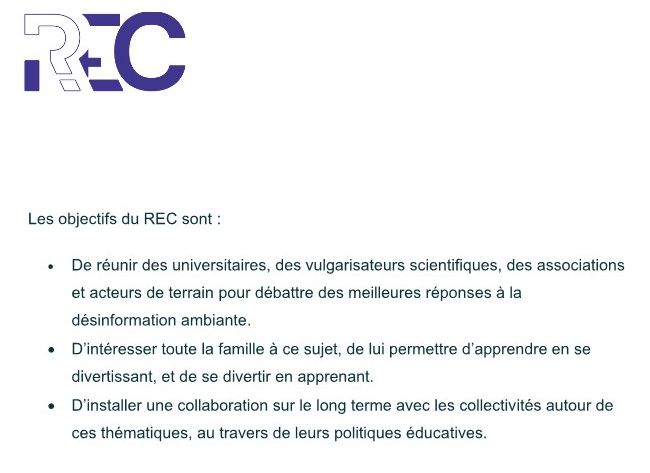
The manifesto of this festival can be found in this document in PDF format in French: REC2021_Manifeste.pdf
2.3. My personal choice▲
To cover this festival, from the programming, I chose the following activities:
- The critical mind today
- What is the critical mind?
- How to express disagreement and debate intelligently
- Stereotypes about the human body
- Critical mind and health
- Critical mind and education
- Critical mind and information
3. My day at the event▲
The day began with the inauguration of the event, a round table with four guests: Laurent Chérubin, mayor of Labège, regional councilor and vice-president in charge of the development and economic animation of Sicoval, the community of urban area in the south-east of Toulouse, Victor Denouvion, president of Haute-Garonne Numérique and departmental councilor, Jacques Oberti, mayor of Ayguesvives, president of Sicoval and agricultural engineer, specialist in information systems by profession and Marc Sztulman, regional councilor of Occitanie, lawyer and teacher-researcher at Toulouse 1 Capitole University. This round table is moderated by Boris Georgelin, installed in the center in the photo below, as for all the different round tables that will take place in the amphitheater of the Diagora center during the day.
During the day, I took the time to write notes in a small notebook of which I share in this post of my blog some elements that I hope constructive and consistent for an open and solid reflection.
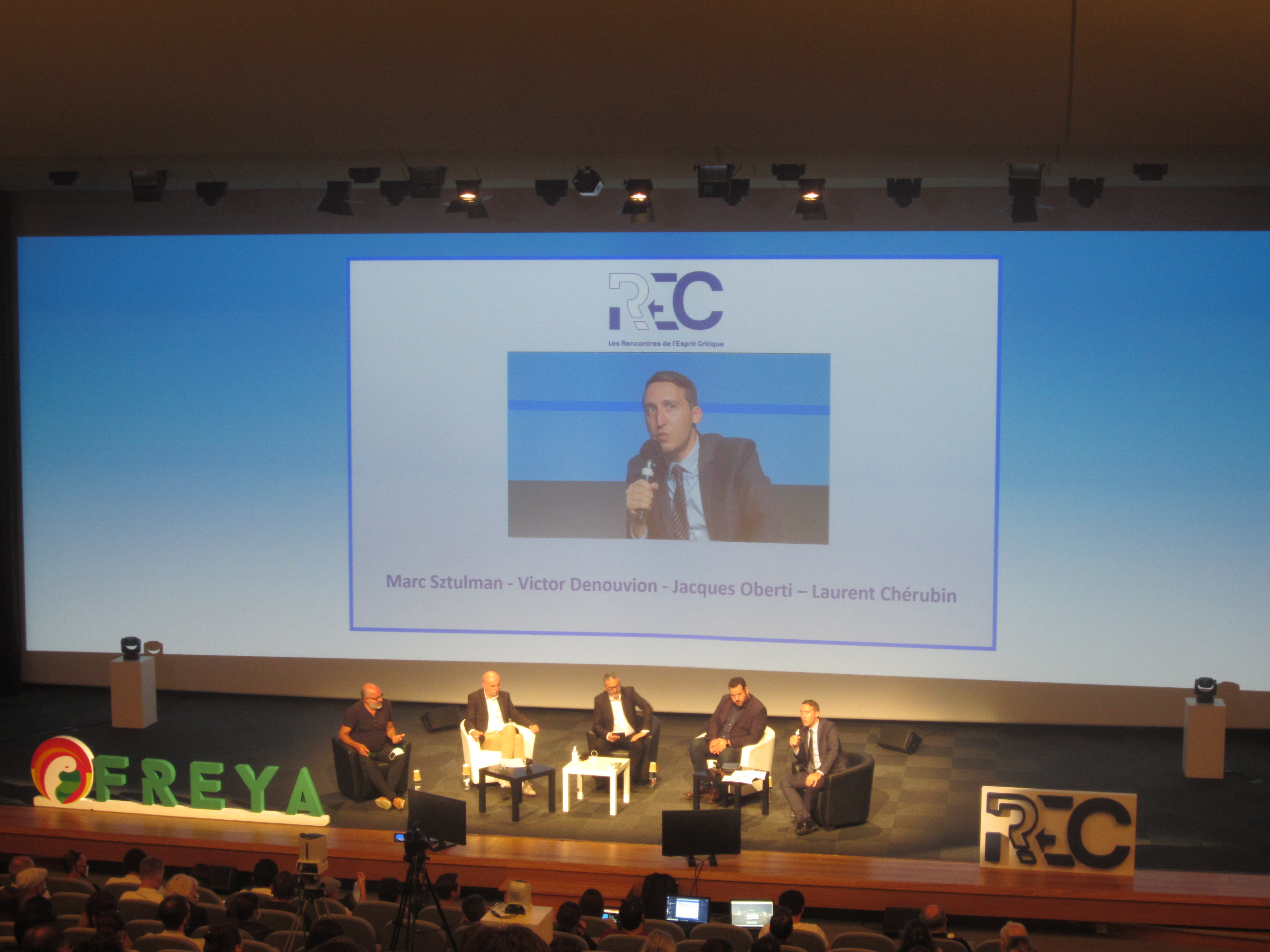
Sonia Kanclerski. Canon IXUS 220 HS. CC0.
Here is a Youtube video link on this inauguration of these “Rencontres de l’Esprit Critique“, that is to say Meetings of the Critical Mind, the first of the name:
For my part, I arrived near the end of this inaugural launch. Enough to listen and remember three words by Marc Sztulman.
L’individu moyen avait moins de 45 secondes de concentration continue sur un sujet déterminé et que depuis 20 ans, on a perdu 6 secondes de concentration.
The average person had less than 45 seconds of continuous concentration on a specific subject and for 20 years we have lost 6 seconds of concentration.
Marc Sztulman, REC 2021, September 18, 2021 [~10:40]
La raison du plus simple est toujours la meilleure.
The simplest reason is always the best.
Marc Sztulman, REC 2021, September 18, 2021 [~12:30].
Je me suis demandé quel était le premier héros, la première figure de la littérature à avoir adopté ce type de pensée, cette pensée de l’envers du décor, cette pensée simpliste, cette pensée finalement qui croit tout ce qu’il pense, […] c’est Don Quichotte.
I wondered who was the first hero, the first figure in literature to have adopted this type of thinking, this thought from behind the scenes, this simplistic thinking, this thought that ultimately believes everything he thinks, [ …] he is Don Quixote.
Marc Sztulman, REC 2021, September 18, 2021 [~13:45]
Now it’s time for the various round tables and other activities of the day 🙂
3.1. The critical mind today▲
The following round table in the amphitheater of the Diagora center in Toulouse-Labège questioned the notion of critical mind with four guests: Pauline Bouty from the channel La mal biaisée, Clément Frèze, mentalist, director, author, Thomas C Durand from the La Tronche en Biais channel and Samuel Buisseret from the Mr. Sam channel.
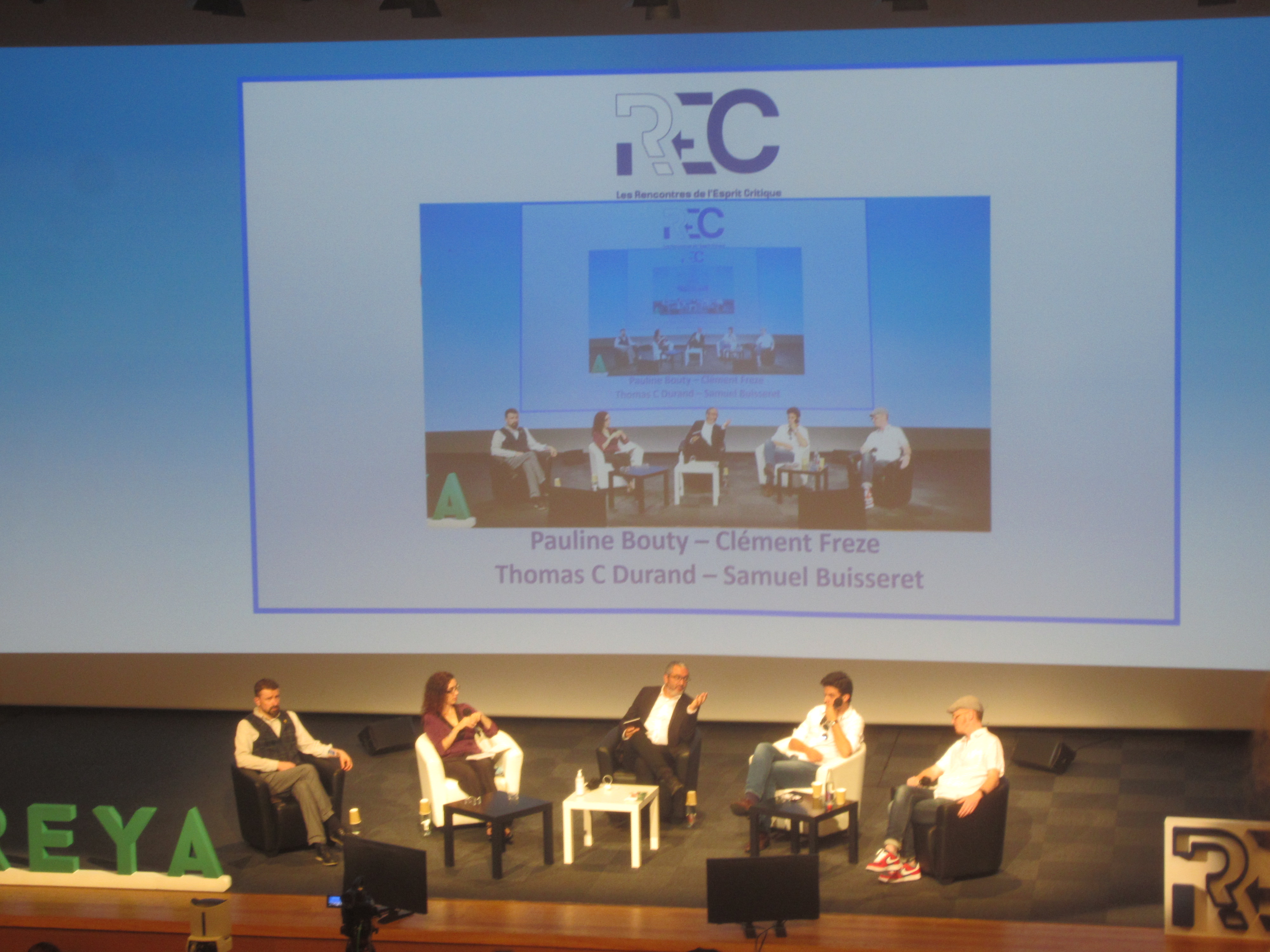
Sonia Kanclerski. Canon IXUS 220 HS. CC0.
I followed the first forty minutes of the discussion, here is a Youtube video link in French : REC2021 – Lect N°2: what is the critical mind today?
The flagship expression of the day: the critical mind
I share a definition of a guest of the round table, Thomas C Durand, Acermendax, from the La Tronche en Biais Youtube channel, stated at around [04:50].
L’esprit critique est la capacité d’évaluer la qualité épistémique des choses qu’on consomme, de savoir si une information que l’on reçoit est crédible ou pas, et donc d’être capable d’aller plutôt vers les sources. […]
Thomas C. Durand, REC 2021, September 18, 2021.
The critical mind is the ability to assess the epistemic quality of the things we consume, to know whether the information we receive is credible or not, and therefore to be able to go rather to the sources. […]
While the guests were sharing their vision, their conception of critical thinking, curiosity seized me to go and see what is happening in the hemicycle and how the subject is approached with the children… Direction therefore the hemicycle of the Diagora center.
3.2. What is the critical mind?▲
The theme is the same; it is about defining critical mind for a younger audience. This round table intended for children is therefore moderated by Jean-Michel Abrassart, doctor in psychology, Scientific skepticism podcast, author of Zack et Zoé, budding zeticians. I’m getting there at the end of the broadcast of a small documentary on the pseudo-existence of the Loch Ness monster.
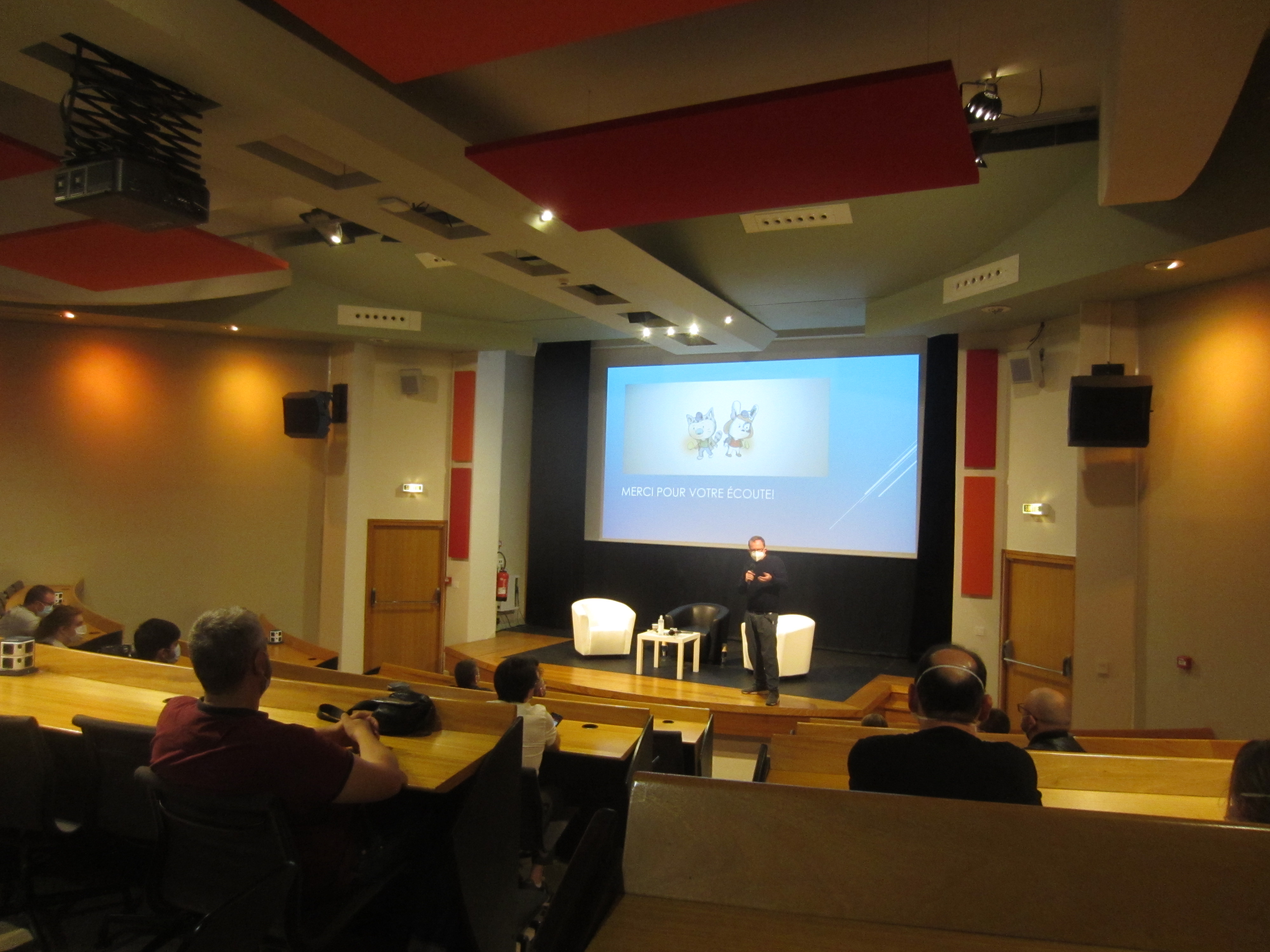
Sonia Kanclerski. Canon IXUS 220 HS. CC0.
Here is the Youtube link of the children’s round table in French: What is the critical mind?
During his speech, the lecturer also shares definitions of the critical mind and the critical thinking for which there currently seems to be no consensus.
A set of attitudes and a set of procedures, habits that we take to approach things.
Website of the French Ministry of National Education.
The speaker is focusing on the importance of attitude. The procedures, the habits, these are skills that one can learn (school, entourage, books, Internet) but the attitude, the behavior allowing to demonstrate a critical mind depends on the personal motivation, the personal interest, the personal concentration.
L’esprit critique est défini comme l’ensemble des capacités qui permettent d’évaluer la qualité épistémique des informations disponibles en vue d’une prise de décision, et de calibrer correctement sa confiance en ces informations selon les résultats de l’évaluation.
The critical mind is defined as the set of capacities which make possible to evaluate the epistemic quality of the information available for decision-making, and to correctly calibrate one’s confidence in this information according to the results of the evaluation.
“Définir et éduquer à l’esprit critique”, Pasquinelli E., Farina M., Bedel A., Casati R., Rapport ANR (P. 4), 2020.
The speaker also shares a definition of critical thinking.
The critical thinking is the frame of mind which consists in naturally seeking to criticize information (attitude), and the technical capacity to be able to do so if one is willing to do so (skills).
Jean-Michel Abrassart, REC 2021, September 18, 2021.
The speaker shares a point of history: the emergence of scientific skepticism and zetetique.
Para committee founded in 1949,
Jean-Michel Abrassart, REC 2021, September 18, 2021.
Commitee for Skeptical Inquiry in 1976,
Zetetique by Henri Broch in the 1980’s.
During this roundtable, the speaker is showing a short documentary from Discovery channel on the pseudo-existence of the Loch Ness monster (toward [~ 10:39]), and, just before its broadcast, suggests to think about skills of the critical mind to use: what to do after watching such a documentary?
Among the actions, going to the Wikipedia encyclopedia to have more neutral information than that given by the documentary, doubting the data, asking questions about the content: “What about an elephant’s trunk? Something other than the Loch Ness monster… “, look for fallacious arguments: the documentary always shows the same image of the monster while it is also said that there are thousands of testimonies, the form of the documentary which is sensationalist and must therefore invite distrust, suspicion, for example.
And so, a non-exhaustive list of skills [~ 19:10] can be:
- Evaluate the plausibility and relevance of a statement,
- Evaluate the reliability of the source (media education),
- Evaluate the contents of a statement (supporting evidence),
- Rhetoric (fallacious arguments),
- Logic, the way of reasoning (reasoning),
- Meta-cognition (personal reflection).
The critical mind is therefore, according to the lecturer, a mixture of two things: the scientific method and philosophy.
The speaker brings out two remarks about critical mind:
- The critical mind requires knowledge in the field being examined,
- The critical mind is not something that one would definitely possess for all fields.
Finally, the speaker shares French resources for children: Contes philosophiques racontés par mon chat (Philosophical Tales Told by My Cat), Les p’tits philosophes, Zack et Zoé, zététiciens en herbe (The Little Philosophers, Zack and Zoe, Budding Zeteticians), a series of books to introduce young people to zetetique, of which he is the author, and for teenagers: Martin et le gourou (Martin and the guru), Les secrets des sorciers (Secrets of wizards), Crédulité et rumeurs (Credulity and rumors).
3.3. How to express disagreement and debate intelligently▲
Around 11 a.m., it’s time for a new round table in the hemicycle of the Diagora center, moderated by the youtubeur and author Nathan Uyttendaele of the Le chat sceptique channel. This table questions the issue of disagreement: what to do when we disagree with the person we’re talking to? The speaker invites us to think about the question together and offers a “facilitator” tool … to express our own disagreement intelligently 🙂
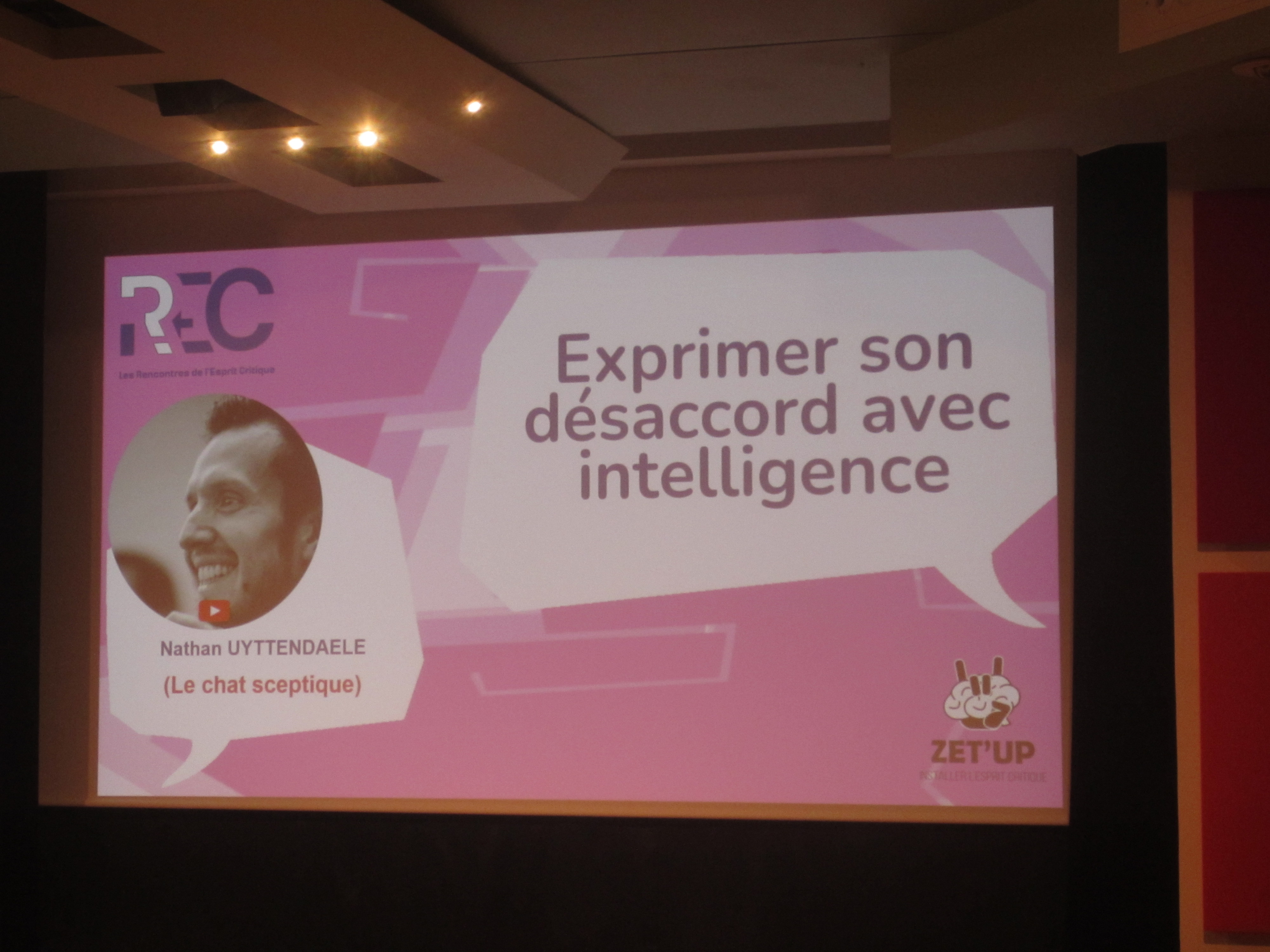
Sonia Kanclerski. Canon IXUS 220 HS. CC0.
I share the French youtube link of the children’s round table: How to express disagreement and debate intelligently.
The speaker begins by presenting several examples of discussions, reactions, debates where there is a disagreement: like the seasons of Game of Thrones but not the last, the effectiveness of acupuncture, a reaction via a video on the documentary Hold-up, a right of reply on a book questioning the existence of God, among other things.
During his speech, the speaker shares definitions on the following concepts:
Refute X: prove that X is false.
To contradict: to say the opposite of what someone says; it can also mean saying something else and not exactly the opposite.
Deny: in reaction to an accusation, say that it is unfounded.
Sophism: reasoning that appears to be valid but is not. Often used, with the aim of deceiving.
Nathan Uyttendaele, REC 2021, September 18, 2021.
To express his disagreement and debate in a peaceful atmosphere, the speaker suggests using a facilitating tool allowing a constructive dialogue if it is used wisely: Graham’s target. (All is in the ‘used wisely’ words. Smile 🙂 )
La cible de Graham est une représentation légèrement différente de la pyramide de Graham, avec comme but principal de maximiser les chances de découvrir la vérité, en visant le plus possible le centre de la cible.
Nathan Uyttendaele, Wikipédia FR, spring 2019.
(Graham’s target is a slightly different representation of Graham’s pyramid, with the main purpose of maximizing the chances of finding the truth, aiming as much as possible at the center of the target.)
https://fr.wikipedia.org/wiki/Nathan_Uyttendaele#Cible_de_Graham
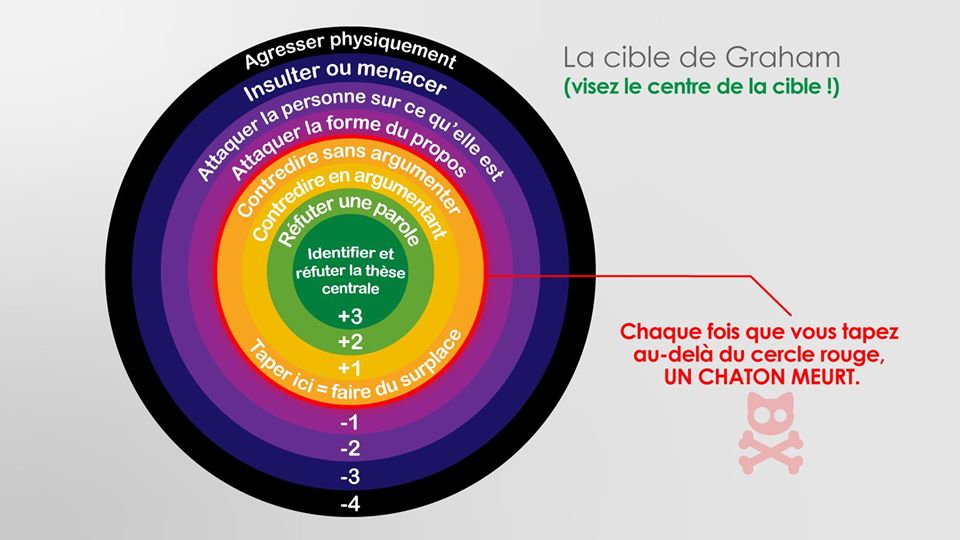
https://fr.tipeee.com/chatsceptique/news/60905
Nathan Uyttendaele, Le chat sceptique.
A playful moment…
To show the principle of the tool, the speaker wrote a little story: the vice-president of a company gives a speech in front of an assembly of employees to explain the actions to be followed in order to improve the results of the company; in the end, several employees react to her words. Several participants of the round table in the hemicycle read several reactions and then we have to identify where the reaction falls in Graham’s target.
Of course, the author-youtuber mentions that this tool must be used in a non-naive way, … with intelligence therefore.
To end this paragraph, a personal anecdote
By evoking this round table at home, I will learn that the family library contains the work… L’art d’exprimer son désaccord sans se fâcher (The art of expressing your disagreement without getting angry) by… Nathan Uyttendaele, since my husband offered it to himself recently 🙂
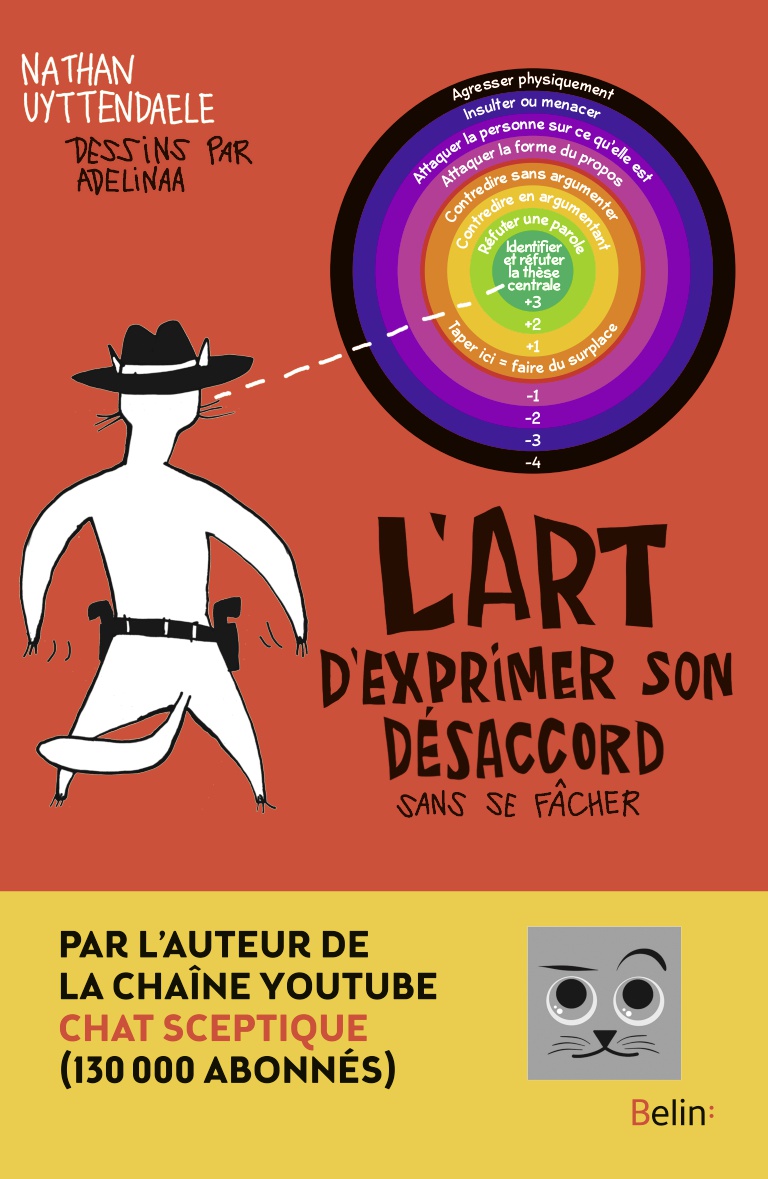 |
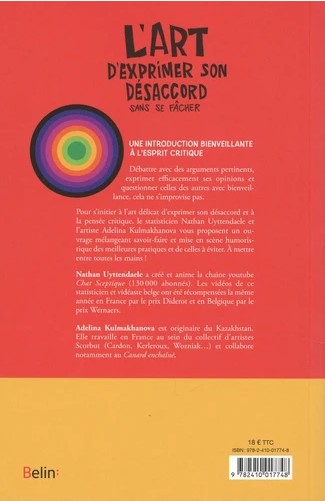 |
L’art d’exprimer son désaccord sans se fâcher, Nathan Uyttendaele, (illustration Adelina Kulmakhanova), Belin éditeur, 2020, 174 p., 12 × 20 cm (ISBN 2410017746, EAN 978-2-41001-7748).
Tick, tock… It’s time for the lunch break. Knowing the area, I left the Diagora center to go to a Japanese restaurant less than ten minutes walk.
3.4. Stereotypes about the human body▲
After lunch, I return to the hemicycle for a new round table: Stereotypes about the human body, moderated by two guests: Jean-Noël Vergnes, university hospital dentist and Fantine, general medicine intern.
I share the youtube link in French of round table for children: Stereotypes about the human body.
In this round table, a series of statements are quoted to the public who must decide: true or false.
- When you are a minor, one of the parents must be present and the doctor can repeat what he is told to the parents. [04:30]
- The first time we make love, it inevitably hurts. [14:09]
- Listening to music too loud can damage your ears and make you deaf. [10:15]
- To lose weight, you must ban meat and sweet and fatty products. [19:07]
- A glass of wine and a shot of vodka contain the same amount of alcohol. [29:09]
- The pill makes you sterile and causes cancer. [36:22]
- Oral statement: about tooth brushing, you brush your teeth to keep your mouth clean. [36:50]
The guests justify each answer by providing detailed information, knowledge on the topic addressed by the statement. I did a faultless. Yeh! 🙂 And you ?
And finally, the word empathy is mentioned for the first time today. Phew! 🙂 (I am relieved because I believe that in a conversation between humans, especially when there can be animation due to felt emotions, empathy is an essential skill so that the discussion does not drift into an argument, altercation or fist fight.). The dentist mentions empathy with the following words:
Et donc, pensez à ça dans les deux sens, vous, les petits enfants ici, vous n’aimez pas avoir mal, et parfois ce que vous faites peut faire mal à d’autres aussi, et donc quand vous sentez que vous faites mal à quelqu’un, mettez-vous à sa place, ça s’appelle, c’est un mot qui s’appelle l’empathie. Se mettre à la place de l’autre. Se mettre à la place de l’autre, c’est une vraie compétence qu’il est important pour les enfants d’en favoriser le développement. Savoir que vous faites mal, c’est très important pour arrêter, pour pas faire à d’autres ce que vous n’aimeriez pas qu’on vous fasse.
Jean-Noël Vergnes, REC 2021, September 18, 2021. Round table: Stereotypes about the human body [18:10].
(And so, think about it back and forth, you little kids here, you don’t like to hurt, and sometimes what you do can hurt others too, and so when you feel you are hurting to someone, put yourself in their shoes, it’s called, it’s a word called empathy. Put yourself in the other’s shoes. Putting yourself in the other’s shoes is a real skill that it is important for children to promote in their development. Knowing that you are hurting, it is very important to stop, not to do to others what you would not like to be done to you.)
At the end of this series of statements, the two guests share their conclusion. Here is the conclusion of Jean-Noël Vergnes, who reiterates the importance of ‘putting yourself in the other’s shoes’:
La conclusion que je proposerai, c’est, vous, les enfants, vous êtes les futurs adultes de demain, donc, c’est de revenir un peu sur ce que l’on disait au début, de penser aux autres, en termes de relation, et en termes de ce que vous n’aimeriez pas que l’on vous fasse, d’être ouvert, d’être heureux dans la vie, en étant curieux, en critiquant positivement et négativement les informations qu’on vous donne, et encore une fois, de retenir que, la santé, votre santé, elle vous appartient, et c’est un capital qu’il est bon de préserver pour vivre heureux le plus longtemps possible.
Jean-Noël Vergnes, REC 2021, September 18, 2021. Round table: Stereotypes about the human body [44:50].
(The conclusion that I will propose is, you, the children that you are the future adults of tomorrow, therefore, it is to go back a little on what we said at the beginning, to think of others, in terms of relationship, and in terms of what you wouldn’t like to be done to you, be open, be happy in life, by being curious, by criticizing positively and negatively the information you are given, and once again, to remember that health, your health, it belongs to you, and it is an asset that it is good to preserve in order to live happily as long as possible.)
Fantine in turn concludes by also insisting on the importance of curiosity, by inviting the children to ask themselves questions. These are her words:
Je vais insister sur le côté de la curiosité, on voit souvent des dérives sur les pseudo-sciences, les pseudo-médecines que je vous invite d’ailleurs à découvrir avec un atelier qui sera [à Diogara] à 16 h et à 17 h, c’est souvent dû à une méconnaissance du corps humain, alors, les enfants, posez-vous des questions sur comment ça marche, pourquoi on pète, pourquoi on baille, qu’est-ce qu’il se passe quand je mange quelque chose, où ça part, le pipi, c’est fait de quoi, et puis, mon zizi il sert à quoi, posez-vous des questions, demandez à…, désolée papa et maman, demandez à papa et maman, posez-vous des questions, soyez curieux, découvrez votre corps, et voilà soyez curieux d’apprendre, parce que c’est en sachant comment votre corps fonctionne que vous saurez comment le préserver, comment en prendre soin, parce qu’un corps, on n’en un qu’un seul et puis une fois qu’il est cassé, il a parfois un petit peu du mal à se réparer, donc il faut bien en prendre soin, c’est comme ses jouets.
Fantine, REC 2021, September 18, 2021. Round table: Stereotypes about the human body [45:30].
(I will insist on the side of curiosity, we often see drifts on pseudo-sciences, pseudo-medicines that I invite you to discover with a workshop which will be [in Diogara] at 4 p.m. and 5 p.m. , it is often due to an ignorance of the human body, so, children, ask yourself questions about how it works, why we farts, why we yawn, what happens when I eat something thing, where it goes, the pee, what is it made of, and then, my penis, what is it for, ask yourself questions, ask …, sorry mum and dad, ask mum and dad, ask yourselves, be curious, discover your body, and there, be curious to learn, because it is by knowing how your body works that you will know how to preserve it, how to take care of it, because a body, we have only one and then once it’s broken it sometimes has a little trouble repairing itself, so you have to take good care of it, it’s like your toys.)
After this round table in the hemicycle, I decided to join the amphitheater to listen to another round table on health entitled soberly: Critical mind and health.
3.5. Critical mind and health▲
After going around the Diagora center to see different workshops set up in the four corners of this large cultural space, I returned to the amphitheater to attend the following round table, for which the Youtube link is: Critical thinking and health. The guests of this round table are Thibaut Fiolet, creator of the Quoi dans mon assiette channel, Fantine, creator of the Fantine et Hippocrate channel, Dominique Pon, ministerial manager of digital health, Dr Jérôme Marti, general practitioner and president of UFML and Marc Gozlan, doctor and science journalist.
From this round table, I mainly retain four points:
- The digital platform for health project presented by Dominique Pon, with heart and dismay,
- A catastrophic inventory of the relationship between the patient and the digital personal data: scattered and not easy to access,
- A lack of collective efforts to work together with the same humanist vision of health,
- Sharing of an analogy with the town planning code so that the State can be effective and play its role, in particular to restore people’s confidence.
- Critics of the management of the COVID-19 pandemic in France,
- How did it go in the office? Rather bad…
- Admit, accept that we do not know, obviously we do not know how to do…,
- Take the time to build care with the patient,
- Poor communication on the contamination of the coronavirus: hands (gel) # air (masks),
- The intervention of Professor Raoult which did a lot of harm (applause from the audience),
- No simple looping clip to explain how the messenger RNA vaccine works (applause from the audience).
- The weakness of generalist journalists in science,
- A media wreck, a mess and misery of information,
- No scientific journalist in the news channels,
- Intellectual laziness of the media,
- A fight between “reassurances” and “alarmists”,
- Where is the duty of obligation of truth for journalists?
- The role of scientists in the public space.
- Lack of (mass) communication from INSERM and CNRS.
- Increase events, demonstrations for “general public” such as the REC to highlight science (applause from the audience),
- How can we prevent the media from producing false information?
- Should the scientists boycott or go to the coalfield towards the conspirators, the denigrators?
In the background, the subject of the next round table was discussed: how to teach critical mind? How to create doubt and trigger the process of ensuring the veracity of what we learn? Skills are therefore to be acquired and/or consolidated. This is the subject of the next round table entitled Critical mind and education.
3.6. Critical mind and education▲
After a short break, it’s time for a new roundtable focusing on teaching critical mind, which I share below the youtube link in French: Critical thinking and education. The speakers of this round table are Jean-Michel Abrassart, scientific skepticism podcast, Bertrand Monthubert, former president of UPS Toulouse 3, Philippe Hubert, head of the Esprit critique, science et médias (Critical mind, science and media) group of IRES-UT3 and Denis Caroti, certified professor, doctoral student, co-founder of Cortex (Collectif de Recherche Transdisciplinaire Esprit Critique et Sciences in French).
Here are the essential elements, the comments shared by the guests that I personally remember about this round table:
- Lack of teaching of epistemology, that is to say the theory of knowledge and the critical study of science and the questions which arise from it: how do we know that knowledge is true? Forever ? How to prove it? Can we get to know each other without going through a scientific process?, etc.
- Cross-disciplinary and non-direct learning, cross-disciplinary approach to critical mind: no discipline “Critical thinking” or “Epistemology”, especially in secondary education (middle and high schools).
- Suggestion: use existing educational resources, including associations and popular universities, to popularize critical mind.
- Fear of asking questions when this behavior should be the norm.
- Beware of hyper criticism, a disease of the critical mind. As much as we should not believe in everything, we should not also doubt everything anyhow.
- Citizens are next to science and not a stakeholder, full-fledged actors and actresses (to grasp and understand it).
After this round table, I continue with a new one entitled Critical mind and information, which is a logical continuation of its predecessors.
3.7. Critical mind and information▲
For this new round table entitled Critical mind and information, the guests are Divina Frau Meigs, professor at the University of Paris III, in information and communication sciences and in English and Anglo-Saxon languages and literatures, Aude Favre, journalist on her WTFake youtube channel, Vincent Flibustier, founder of Nordpresse, Xavier Lalu, independent journalist, correspondent for the newspaper Liberation in Toulouse and Eric Valmir, secretary general of information for the Radio France group.
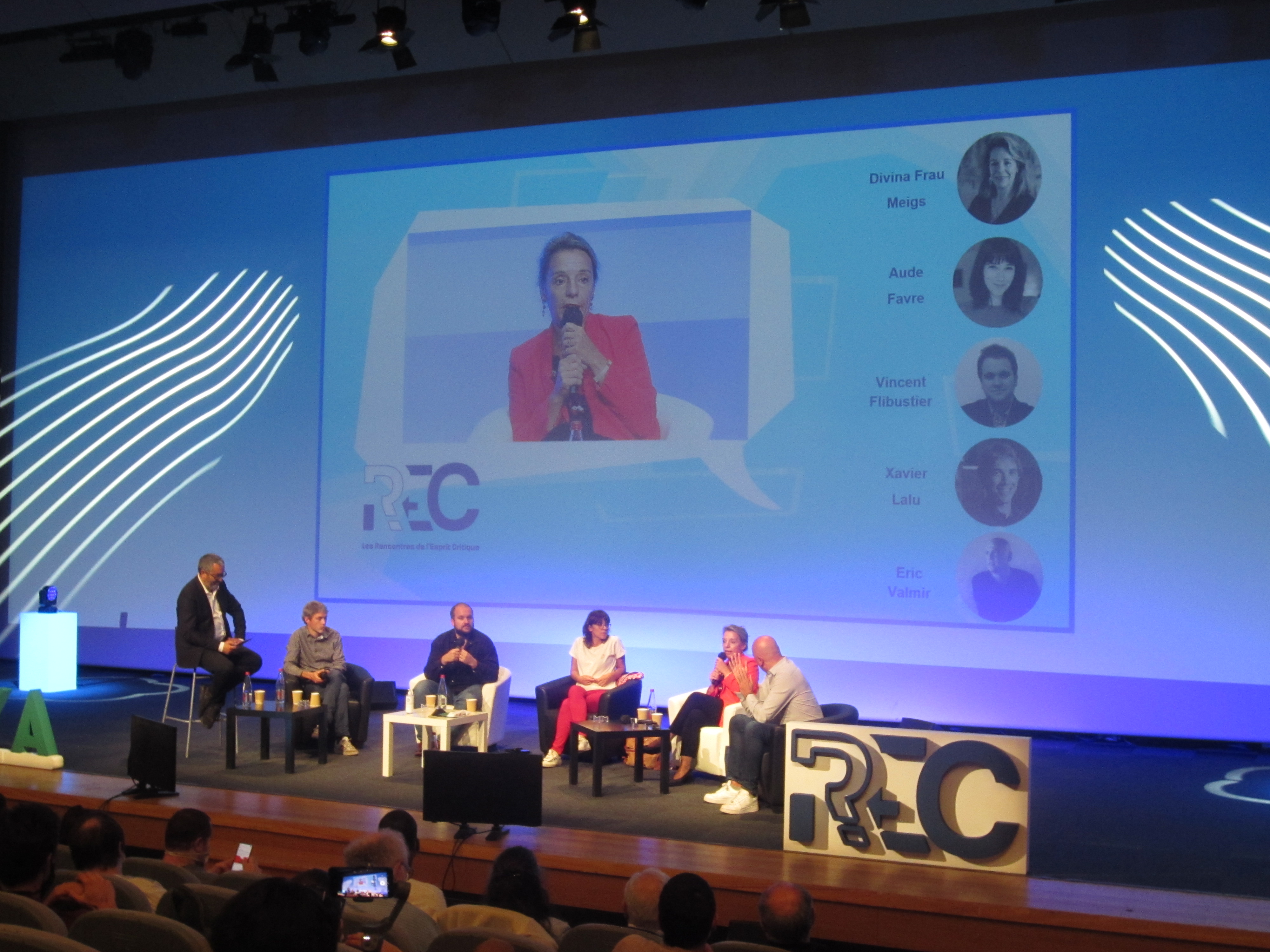
Sonia Kanclerski. Canon IXUS 220 HS. CC0.
I share the roundtable youtube link below: Critical mind and information.
My conclusions from this Critical mind and information roundtable are as follows:
- Fake news and rumors have always existed, but the phenomenon of disinformation has exploded thanks to digital technology.
- The ease of transmission (anyone can create a website disclosing true or false data on the Internet and disseminate through social networks) has come to compete with the work of professional journalists.
- Two consequences of the appearance of this competition are a significant drop in the quality of information and the absence of filter: information and data are no longer verified, sourced, even though this is precisely the heart of journalists’ work.
- Lack of competent scientific journalists in the mass media..
- There is general public mistrust of the media, especially those in the public service where their independence is still being questioned. The suspicion is still there and does not help build trust.
- One solution: be transparent by showing the work of journalists, behind the scenes of how information is produced, to disseminate in mass the making-of of journalism.
- Take these two events: the election of Trump and the COVID-19 pandemic, as salutary slaps, question the way of working and of broadcasting to the general public.
- Currently, it is therefore a crisis of mistrust.
My day at REC 2021 ends with this round table. I left the Diagora center around 6 p.m., not without having strolled the hall one last time to see some workshops associated with the event.
4. My relationship to critical mind▲
What is my personal relationship with critical mind? A list of words immediately pops into my head. Among the first: doubt, verification, proofs, scientific approach, arguments, discussion, empathy, sources, confidence, rationalism, obscurantism, beliefs, ready-to-think, sayings.
4.1. The notion of belief▲
And one day the human being began to believe. For the worst … Belief is something so easy, simple, accessible. A ready-to-think so seductive but which is in reality deceitful, treacherous, sly. Especially for living together.
What is a belief? To answer this question, I attended a zetetic colloquium entitled Space and contemporary beliefs in February 2015. During a conference of the colloquium, Éric Lowen, founder of the Cercle Zététique de Toulouse of the ALDERAN association, deals with this notion. In it, he points out that the word belief is in common use, so common that it is used in very different senses. Sociologists, for example, can use it to refer to any idea, and in this case the word refers to an idea that a person has in mind. There is then no distinction between the notion of belief, idea, knowledge, knowledge, truth. All these concepts are found on the same level. The word belief can even be used in contradictory meanings. I want to share definitions on the notion of belief and the verb to believe.
Belief; it is the common word which designates all certainty without proof.
Definition proposed by the philosopher Alain, whose real name is Émile-Auguste Chartier, at the beginning of the 20th century.
The notion of belief is the fact for a person whoever she is and regardless of the content of the belief and its veracity, to take a notion as true, whether it comes from science or from a completely eccentric framework, without appealing to reason, to a work of reflection, or without seeking and using objective elements which would make it possible to support this affirmation. The speaker Éric Lowen revisits the definition of Alain with these words:
Belief is any idea taken to be true without examination, without even having any objective element to justify it.
Eric Lowen, definition taken from a colloquium entitled Space and contemporary beliefs, February 27 and 28, 2015. Cercle Zététique de Toulouse.
The speaker specifies that the notion of belief is therefore in no way linked to its content but that it is therefore the attitude, the intellectual posture of the person who believes, which can be presented as a form of no -use, under-use, even refusal of use in certain cases of what one can call the critical mind, the faculties of reason, the capacities of the human mind to be able to reflect on the given notions. The notion of belief is an universal problem in the functioning of the human being.
Here is a definition of the verb to believe:
To believe, it is the attitude of taking for true a notion without action of reflection, without process of reflection, and, in certain cases, in spite of the total absence of objective information, of objective elements to support it.
Eric Lowen, definition taken from a colloquium entitled Space and contemporary beliefs, February 27 and 28, 2015. Cercle Zététique de Toulouse.
The speaker also adds an important remark on belief: one can make beliefs with true things. The veracity of the object of belief is thus not in question.
The information that we are given may be true but if we do not think about it, if we are content to take it for real because the teacher, the master, the lecturer, the ‘magister dixit’, the guru, the master of thought, the pope, the theologian, the person we love says it, at that moment, one makes a belief.
Eric Lowen, definition taken from a colloquium entitled Space and contemporary beliefs, February 27 and 28, 2015. Cercle Zététique de Toulouse.
With my words, I write: what makes the belief, it is not the object of the belief but the absence of critical mind, the absence of doubt, the absence of reflection from the person which make that she makes it a belief, even though the object of the belief may be true. Except that the consequences can be dramatic when the information is false…
A direct consequence is that believers think they have a truth, that they are right. This is why when we talk about the notion of belief, we do not question the sincerity of the person. It is because the person is sincere that beliefs work the better. As if sincerity were a guarantee of truth. While we can not get anything out of it!
Belief is initially an act of non-use of cognitive faculties, critical mind skills, doubt, free will but when one strongly adheres to a belief, it then becomes a stifle of critical mind and the capacities of reason. The believing person becomes autistic to any rational explanation that may be offered.
Moreover, to make matters worse, we can easily adhere to a belief because it plays on emotional registers, on inner convictions, because it ultimately goes in the direction of our emotions and our ego. This is also one of the reasons why a person rarely changes their mind. You only need to adhere to one belief in order not to take the necessary distance to adopt the tools of critical mind. This is why I emphasize that it is important to always have the reflex to question, to verify what you are learning, otherwise you can never understand. Do not rely on the reliability, the confidence of the person and therefore pay attention to the cognitive bias of the “authority argument”, in one way or the other (do not pay the price but do not also put forward the value of one own words).
4.2. Useful tools that I use in a debate▲
An useful approach in a discussion is the use of refutation, a fundamental principle of science. So that the refutation can be used, it is necessary that the discussion, the subject, the experiment rests on a thesis which one can… refute. Indeed, science cannot directly prove the non-existence of something. We cannot prove that the invisible blue unicorn does not exist because, thus formulated, the hypothesis is not refutable. On the other hand, we can prove that this invisible blue unicorn did not build the Eiffel Tower or write the Harry Potter saga for example. We can’t prove that Santa Claus is bearded or not, with a red suit or not, but we can prove that he doesn’t bring the presents to all the children around the world on Christmas night. We can refute as soon as a hypothesis put forward is refutable. We can then conclude on the veracity, the solidity of the thesis.
Another approach more meaningful and in practice more effective in my opinion: absurd. Generally, when we do not agree with a thesis, we oppose, we use arguments to weaken it, or even discredit it, which means that the tone can quickly rise, the debate become heated and the discussion a cacophony. To avoid the virulence in a ping-pong exchange and calm the conversation, it may make more sense to use the reductio ad absurdum. What would happen if the thesis is true? The more outlandish the subject of the thesis, the more grotesque the consequences and discredit the thesis.
Two useful tools in my wallet: refutation and absurd (with reductio ad absurdum).
4.3. An attention to vocabulary▲
I realize that over time I have come to dislike the vocabulary at all, the semantic space of the notion of belief. I don’t believe, never. The same goes for the notion of faith. The term displeases me deeply in its use. I don’t believe what I’m doing. I’m sure what I’m doing and that doesn’t mean I’m not making a mistake! So it’s not a lack of humility on my part. I emphasize that my action is based on solidity, not on nothing or wobbly. When in doubt, I prefer to use “I’m reserved, I have reservations about“, “I’m not sure, it is not certain that”. Likewise, for the word faith, I don’t like to use the phrase “I have faith in”. I prefer “I trust“. No doubt, I want not to maintain verbal obscurantism, vagueness in my choice of words. The attitude, the intellectual posture for building reliable knowledge also begins with careful attention to the vocabulary used.
5. My personal feedback on the event▲
This first edition of REC 2021 is undoubtedly a popular success with a family audience and a good quality of lectures and workshops, with guests who are very relevant in their interventions for a great promotion of critical mind. I share pieces of thought, ideas and other suggestions and a digital album too.
5.1. Sharing of some ideas and suggestions▲
- Create a space for associations of the zetetic movement and scientific skepticism (local, national or even international) to make them visible. Among others:
- For the Occitanie region: ALDERAN avec le Cercle Zététique de Toulouse et CZLR, le Cercle de Zététique Languedoc-Roussillon de Montpellier,
- At the national level: AFIS, l’Association Française pour l’Information Scientifique (French Association for Scientific Information).
- Create a digital space for participants to disseminate, discuss, promote critical thinking and above all maintain and nourish a link (forum, digital project, workshops, games, online testimonials…). [Since the beginning of October, I learned of the existence of a Facebook group dedicated to REC: https://www.facebook.com/groups/383145729874077 ]
- Make a plan of the workshop sites. (I haven’t seen any).
- Offer a paper and digital guestbook. (I haven’t seen any).
- Add several facilitators to guide the public in the workshops or accompany them (participate, play with the participants).
5.2. The lack of visibility for women▲
I know that this question of society is controversial but, and the but is important, it must be questioned if we want to build a serene and peaceful coexistence. This problem is the lack of visibility for women in mixed scientific and cultural events.
When I attend any event where I have the serious feeling that there is a lack of women and that the speaking time is objectively unbalanced, my stomach knots and I feel my viscera upside down. Especially when I see that it looks creamy for my peers, with the exclusive plural masculine: I do not listen to any conspicuous and obvious discomfort or disturbance. As if men legitimize this state or, in any case, not make it a priority subject. How is it possible ?
Formula 1 has been a mixed sport for 45 years, but no woman does. Science is a mixed discipline but we are counting to check it.
Sonia Kanclerski, engineer development, Pause-café chez Sonia blog, REC 2021 post.
How to transmit, teach, educate in critical mind when you do not yourself take a step back, the necessary and sufficient distance, to… take the measure of this question of living together? Which credibility can be given to a movement if we leave this issue of visibility aside? What to say to my children? My oldest and youngest will likely watch videos of the event sooner or later. I will once again have to explain the situation and the context of this injustice and it is heavy when this problem often happens…
The lack of visibility of women in scientific and cultural events maintains the idea that science is only for men, not for women, and legitimizes this idea.
Sonia Kanclerski, engineer development, Pause-café chez Sonia blog, REC 2021 post.
I know most of the organizers are… kind and in good faith. We do not take in hand a mission by thinking of doing wrong. We do not grow up with the idea of becoming an “arrant turd”, it is not a life project, we can all agree,… but the observation and the facts are what they are. It is really necessary to keep in mind that currently the issue of visibility is still unequal and therefore it is compulsory to take it into account when establishing the guest list. Yes, it is not easy, but to live an injustice and to witness it, is it easy? And above all, is it fair for women scientists, and all women in general, even though in France, they were banned from studying at university without their husband’s consent until the start of World War II? because of a law promulgated by… the men themselves? Thus, to be fair, one must necessarily act accordingly to counterbalance injustice. In the name of social justice.
A key ? Yes, it was also mentioned during the day: empathy. I share the definition of American psychologist Carl Rogers:
The state of empathy, or being empathic, is to perceive the internal frame of reference of another with accuracy and with the emotional components and meanings which pertain thereto as if one were the person, but without ever losing the “as if” condition.
Carl Rogers, A Way Of Being, p. 140, 1980.
Then I share mine now by choosing ‘my words to say it’:
Empathy is the faculty of being able to put oneself in another person’s shoes, thus discovering their personal universe, their emotional state, their way of thinking, their being as a whole, with their own referential, by putting own ego aside and without being affected by this connection.
Sonia Kanclerski, blog Pause-café chez Sonia, On becoming a person post, April 2021.
With empathy, we thus add to our personal knowledge other information and knowledge from other people with whom we live, greatly contributing in this way to better measure the consequences of our decisions, actions and also of our silences and “let it go”.
So, I retain a single question as a starting point to advance the issue from the point of view of men: how is it that the lack of visibility for women in all fields of public space does not put doesn’t touch you in case of compassion, at least make you uncomfortable with using empathy? We can listen to this paragraph as an invitation to think about: question yourself and question others, men AND women, and beware of confirmation bias.
Finally, my suggestion here is therefore to try to get even closer to parity in the choice of guests.
5.3. My personal photos▲
On the occasion of this outing, I took some photos with my faithful little red camera, a CANON IXUS 220 HS, which I share in a small digital album displaying them with Image gallery with zoom. Here is the link of this small digital album: http://albums.soniakanclerski.com/rec2021/en/.
6. And the following?▲
The organizers have published and posted a feedback on the REC 2021: https://www.rec2021.com/
We can find:
- thanks from the organizers,
- a photo review of the day (the reception hall, the amphitheater, the hemicycle, the central square for workshops and exhibitions),
- the youtube links of the videos of the adult round tables presented by Boris Georgelin,
- the youtube links of the videos of the children’s round tables presented by Aidan et Matias,
- the relaxing evening with the Skeptical Burger Quiz and the Clément Freze show entitled in French “La séance“,
- the list of event partners.
To review the REC 2021 event web page: https://www.rec2021.com/rec2021/
Sincerely hoping for a REC V2.0! 🙂
(Good news: in fact, following an email from the organizers in early October 2021, there will indeed be a REC 2022!)
Zetetically, Sonia Kanclerski












